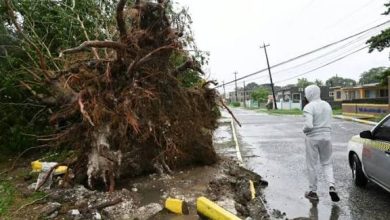
I woke up to the news of a five-day flood notice across 19 states in Nigeria. Now, we have just a few days left. I could not shake off the urgency in my spirit.
This isn’t just another weather update. It is a warning—one that must be heeded. As someone whose research intersects climate change, extreme weather events, and their impact on intimate partner violence and gender roles, particularly the burden on men in vulnerable communities, I know how quickly things can spiral when we do not prepare. When we know better, we must do better.
I can see myself in every skeptical or overwhelmed Nigerian. Before now, I too could have dismissed such warnings as distant or irrelevant. But the evidence is mounting, and ignorance is no longer an excuse. I have seen the aftermath of devastating floods, not just in the abstract data of research, but in real communities—Bayelsa, Lagos, Benue, Anambra, Jigawa, and many more. Entire neighborhoods submerged. Homes destroyed. Human lives lost. Livelihoods gone. What we often forget when we read these statistics are the grief, the hunger, the trauma, and the helplessness that lie beneath the numbers.
My longtime mentor who lives and works in the Modire area of Yola, the Adamawa State capital, recently shared his harrowing experience:
“By divine grace, I escaped drowning by the skin of my teeth two Sundays ago.
“In the wee hours, neighbours woke me up as they were running out with their children. I peeped through my window and saw them wading through water.
“Quickly, I put on my boxers, took a walking stick, and opened the door to follow. As they opened the main gate, more water rushed through. Then I remembered my phone and laptop and risked my life through the floods back to my apartment. There, I dived straight to where the two working tools lay on the floor. I fished them out and hurried out, leaving the door open because the rush of water wouldn’t let me close it.
“When we returned home by 8 a.m., the water had reduced to ankle level. Everything in the house was submerged or floating. We bailed out water for days. The floors are still damp because the house was built in a waterlogged area. My phone’s functionalities have been restored—not the PC’s yet.
“I work with this tab now.
“Friends and hirelings have been coming since that incident to help with cleaning and sanitising my home.”
This is not just his story—it could be anyone’s. A father. A neighbour. A student. A businesswoman. You.
To every Nigerian trying to survive in an already difficult economy, I understand. You are not indifferent—you are exhausted. And yes, many of us have learned to spiritualise our crises. We default to “God will help us.” And indeed, He will. But faith is not a substitute for preparation. Pray if you must—but, please, plan as well.
Let’s be clear on one thing: Climate change is not a Western hoax. It refers to long-term shifts in temperatures and weather patterns, primarily caused by human activities such as burning fossil fuels, deforestation, and industrial pollution. These changes lead to extreme weather events like flooding, drought, and heatwaves—events that are already shaping our everyday lives in Nigeria.
This message is for everyone: Rural and urban dwellers, policymakers, business owners, faith communities, and especially those who still think climate change is an elite or foreign concern. It is not. When rivers overflow in Lokoja, when homes are swallowed in Makurdi, when roads collapse in Calabar, it is not just an international headline. It is our people’s reality.
The Federal Government has allocated ₦6 billion in the 2025 budget specifically for erosion and flood control projects under the Economic Recovery Growth Plan (ERGP). In addition, the National Emergency Management Agency (NEMA) has received ₦10 billion to enhance its preparedness and response for the 2025 flood season. This funding is intended to support nationwide flood mitigation efforts. Please, if anybody knows where these monies are, let them speak up so we can all be enlightened.
More importantly, we must shift from crisis response to crisis prevention. That starts with education. What if governments and foundations invested in early warning systems, flood simulations in schools, local language sensitisation campaigns, and community-led climate workshops? What if we committed resources to prevention with the same urgency we show during disaster relief?
Leaders—religious, traditional, and political—must lead climate literacy campaigns. If they can mobilise people for elections and revivals, they can mobilise them to save lives. One sermon. One WhatsApp broadcast. One community meeting at a time.
And you, dear reader, have a role to play:
Check the weather updates.
Keep your gutters clear.
Educate your family, friends, and colleagues.
Hold your neighbours and local leaders accountable for drainage and infrastructure.
Stop dumping refuse in waterways. Yes, it matters.
This is how nations are built—by collective action, not collective apathy.
Nigeria’s floods are not just the result of heavy rain. They are the product of weak planning, outdated infrastructure, urban sprawl, deforestation, a systemic lack of environmental responsibility—and maybe nonchalance. But mostly, they are the outcome of a mindset that waits until the damage is done.
Let us stop waiting.
To foundations and philanthropists: Fund education and preparedness. It is cheaper than reconstruction. To local governments: Prioritise flood mapping and drainage. And to our faith communities: Teach that Noah built the ark before it rained.
Only the living can tell the tale of what will come. Let us be among them, please.
Let us prepare, protect, and proclaim the gospel of climate responsibility—not just because it is wise, but because it is necessary. For in this struggle, as with all others, the people are not the problem. They are the solution.
And the time to act is now.
•Mr Ukoh, an alumnus of American University of Nigeria, Yola, and PhD student at Columbia University, writes from New York.




